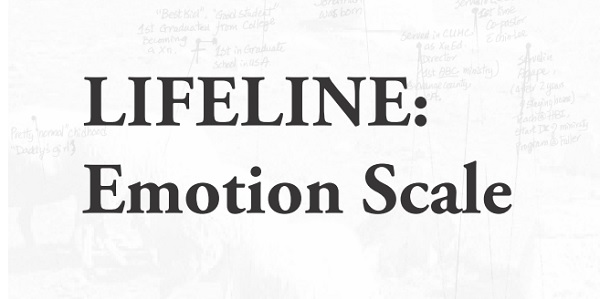Lifeline: Emotion Scale
By Esther Liu

Welcome back to the “Extreme Make-Over: Christian Edition”! I hope and pray that your effort in gauging where you are in your walk with God (using the survey forms included in the last article) these past couples of months have been fruitful. I understand that some of you might be quite surprised (pleasantly or unpleasantly), some of you might be slightly embarrassed (positively or negatively), and some of you might be just plain shocked by the results. Then there are some of you who are confused and simply don’t know what to feel! Well, welcome on board the vessel of discovery and adventure of “Extreme Make-Over”!
A prayer came to mind that might settle your stomach as we begin the next leg of our journey together. It was written by Bishop George Ridding (The Oxford Book of Prayer, p.94) for a time such as this.
In times of doubts and questionings,
when our belief is perplexed by new learning, new teaching, new thoughts,
when our faith is strained by creeds, by doctrines, by mysteries beyond our understanding,
give us the faithfulness of learners and the courage of believers in thee;
give us the boldness to examine and faith to trust all truth;
patience and insight to master difficulties;
stability to hold fast our tradition with enlightened interpretation to admit all fresh truth made known to us,
and in times of trouble, to grasp new knowledge readily
and to combine it loyally and honestly with the old;
alike from stubborn rejection of new revelations, and from hasty assurance that we are wiser than our father,
Save us and help us, we humbly beseech thee, O Lord.

If you are following the general outline of the “Make-Over” plan, you probably know that we are now entering the second stage: cleaning out the debris in the vineyard. The exercise that will start the process of identifying the “debris” is called: “Lifeline: Emotion Scale”.
No one comes from a vacuum. All life experience shapes and molds, not only who we are today, but also how we relate to the people around us and how we handle life events and crises in our own life. This exercise helps us to bring awareness to many “hidden” emotions that might hold us captive, that stunt our growth as sons and daughters of God. Being aware and acknowledging their existence and their impact on our lives is the first step toward freeing ourselves from their grasp.
To demonstrate how this exercise work, I will share my own “Life-Line: Emotional scale” that I did several years ago. It was not an easy decision to share this publicly since it involved many detailed and private events of my life. My prayer is that by sharing some of my very dark and difficult struggles openly with you, you may be freed to dig deep into your own past and identify the “debris” that need to be removed from your lives.
-- At the point of birth, I put the dot on “low” since I was not wanted. My mother attempted abortion twice, but somehow I survived. I was aware of this fact from very early on. My mother and I even laughed about it. But not until I had to put it down on the emotional scale did the effect and true implications of my birth, unwelcomed, uncelebrated and an emotional low point for my mother, hit home. It took me 30 minutes to just be able to put that dot on the scale.
-- Another observation was that all the lows related to death and loss and all the highs related to accomplishments, in education, family, and ministry. It tells pretty clearly what was “important” emotionally for me. Without seeing with my own eyes on the emotional scale, I would never admit that.
-- My daughter’s birth coincided with a loss of ministry. After much struggle, I decided to put my daughter’s birth also in “low”, just as my own birth was. It tells a lot about where my priorities were in life when these particular events happened.
-- When connecting each dot in my life, I realized that there were only extreme ups and downs; there were no middle points. When handling crises or changes (good or bad) in life, I reacted in extreme and emotional ways. It all traced back to my “secret” or should I say my “family secret”.
My oldest sister died when I was 6 or 7 years old. The night before she died, no one really slept. She was crying, groaning, and moaning that she could not breathe. She pleaded with my parents to bring her to the doctor. But I guess that she had “cried wolf” one too many times; my mother refused to take her to the doctor in the middle of the night. I finally drifted into a very uncomfortable sleep after listening to her groaning and pleading for half of the night. The next morning, I went to school as usual with my siblings. None of us knew that my sister had died on her way to the hospital that morning in my mother’s arms.
I came home after school and found the whole house in an uproar. Twenty some neighbors crowded in our small living room. In the middle of the crowd was my mother, sobbing, screaming, thrashing herself repeatedly on the ground. Her hair flew up and down in the air and her clothes were torn. People all around her were crying, talking, and trying to comfort and restrain her all at the same time. I froze in place, horrified. When some adults finally realized that I was standing there staring in shock, they ushered me out of the house quickly.
The next thing I remembered was the day that I came back to our house....a few weeks after my sister’s death. I had no recollection of what happened during these few weeks. Only a few years ago, my sister told me that all three of us were sent to a friend’s house to stay. Later on, I learned that my father broke his leg (he was so distraught that he did not see the steps going down to our kitchen) and my mother had to be sedated by medication for a while. Merely mentioning the name of my sister or seeing her picture would send her into crazy rounds of screaming and sobbing. They no longer were able to take care of us, so we were sent away.
There might have been a funeral; none of us kids knew about it or were allowed to attend. When we came back to the house, my oldest sister’s room was cleaned out, everything she had and every thread of evidence of her existence was gone.
Her room turned into our study room with three brand new student desks. In the blink of an eye (from a child’s perspective), it was as if she had never existed. No one was allowed to talk about my sister. No one was allowed to even mention her name. The rule communicated to us by my parents’ actions was “don’t tell and don’t feel”.
Growing up, I didn’t know this particular incident affected me too much. I thought that I had buried it long time ago. I did not know that I lived in my “Little Ease” (a place where I was imprisoned by the past and the fear, the anger, and the sense of abandonment) and thought it was fine. Then, in 1984, I faced the sudden death of my father. I went into a deep and dark emotional dungeon for over a year. However, the effect of my sister’s death (and how it was handled) on me finally surfaced in full force when I was in the seminary and my internship required me to visit patients at the hospital.
The first person that I had to visit was a cancer patient facing a slow and painful death. I could not handle it. His painful groan (even though he was on high dosage of morphine) and his facial expression (his eyeballs rolled into his eye sockets because of the severe pain) stayed with me for a long time. I realized that I could handle neither hospitals, nor sickness, nor suffering of most kinds. I was useless as a minister, wanting and trying to bring comfort in the midst of suffering.
Only through counseling and the grace of God did I finally learn that, because of my past experience I had only two modes of emotions when facing anything I deemed threatening: extremely emotional (crying, falling into pieces, irrational thinking, etc.) or complete denial without any emotion. I realized my desperate need to control, so that somehow I could prevent any crisis from happening to me or my family.
When I finished the “Life-line: emotional scale” exercise, for the first time in my life, I literally and visually saw how my emotions truly had only two modes: high and low and how they have been jumping up and down in my life. I could also observe its negative effects on my ministry and my relationship with my husband and my two children. Knowing how profound was my sister’s death (and how it was handled) and its influence on me was only the beginning of my journey of healing and learning a better way to deal with life crises. My prayer is that, after years of swinging from one extreme emotion to another, I am finally able to let go of my fears and therefore my urge to control, and allow God to be in control and trust him in all my decisions, especially in crisis. I also pray that after breaking free from my own “Little Ease,” I am not too late in setting a healthy model (open communication, sharing honest feelings, freedom to feel and talk, developing positive and constructive view about losses, trusting God’s love, etc.) for my children for facing crises in life. My prayer for you, my beloved readers, is that you too will allow God’s love to shine like light into the darkest corner of your hearts and souls and be freed from your “prison of secret.”

Now it is time for you to construct your own “Life Line: Emotional Scale”:
1. Before you use the blank chart included in this article, write down on a piece of paper of all the important events in your life. Events that have impacted your life in some significant ways. Include both positive or negative experiences.
2. Line them up according to the time frame when they happened.
3. Use your “Life-Line” Emotional Scale” and put each events on (starting from birth….you might be surprised to learn how many people’s birth was not a celebrated event) and assign an “emotional scale” to it: Depends on how old you are, you can decide what year interval you are going to use (every 3 years if you are 36 years old or 4 years if you are 48 years old, so on and so forth). Think through each event very carefully: why it was chosen (why is it important?) and why a certain emotion was attached to it? How does it impact who you are today, how you see things, and how you handle different relationships in your life?
4. After you finish putting down all the dots and labeling them, use a ruler and connect all the dots. Now, spend some time alone before God and allow God to speak to you through this exercise.
I don’t know what God will reveal to you through this exercise. I have seen people leave the class in tears, and some never returned. I have angry husband asking me what I have done to his wife that she could not sleep for three nights afterwards. I was challenged about what on earth would be the benefit of digging out all the “old dirt” since he/she dealt with them already….shouldn’t Christians look forward, not backward?!
So here is another word of caution: darkness does not like light. Secrets want to stay secret so they can control you, and being confronted with your past, forced to identify the “debris” and making a decision to point them out takes time and courage. Many times it takes professional counseling and guidance. As I shared before, stage 2 is not a fun or pretty stage to be in. Do surround yourself with trust worthy brothers and sisters. Enlist their prayers and support. And most important of all, walk closely and humbly with God daily because “the LORD is my shepherd, I shall not be in want. He makes me lie down in green pastures, he leads me beside quiet waters, he restores my soul. He guides me in paths of righteousness for his name’s sake. Even though I walk through the valley of the shadow of death, I will fear no evil, for you are with me; your rod and your staff, they comfort me. You prepare a table before me in the presence of my enemies. You anoint my head with oil; my cup overflows. Surely goodness and love will follow me all the days of my life, and I will dwell in the house of the LORD forever.”
Until we meet again next time, may the words of Psalm 23 reign in your heart and soul. Amen!


 Esther Liu, M.S., M. Div., D. M., has been a pastor and minister of Christian Formation for the past 15+ years. Her calling in life is to “make people uncomfortable”. She has been married for 22 years with two wonderful children. When she is not out challenging people to grow and to be more like Christ, she enjoys reading good books, taking long walk with her husband, and water rafting down in some class V rapid in CA rivers.
Esther Liu, M.S., M. Div., D. M., has been a pastor and minister of Christian Formation for the past 15+ years. Her calling in life is to “make people uncomfortable”. She has been married for 22 years with two wonderful children. When she is not out challenging people to grow and to be more like Christ, she enjoys reading good books, taking long walk with her husband, and water rafting down in some class V rapid in CA rivers.